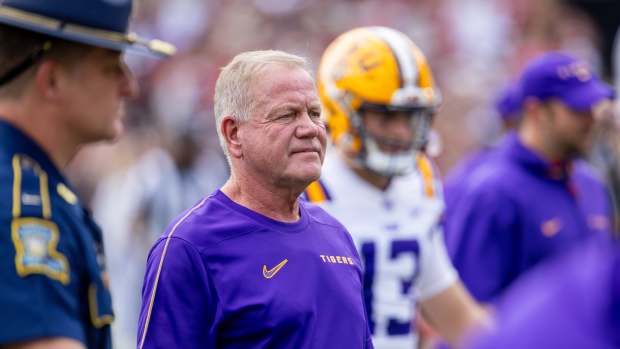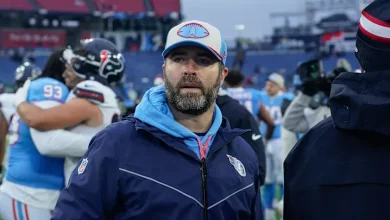Brian Kelly’s LSU Tigers face shocking setback as 5-star recruit hints at SEC poaching drama

In a stunning turn of events, LSU’s football program, under the leadership of head coach Brian Kelly, is grappling with significant setbacks in its recruiting efforts. The Tigers have witnessed a series of high-profile decommitments, including the loss of five-star quarterback Bryce Underwood to Michigan, a move that has sent shockwaves through the college football community.
Bryce Underwood, the nation’s top-ranked recruit, had been a cornerstone of LSU’s 2025 recruiting class. His commitment was seen as a major coup for Kelly and his staff. However, in a dramatic turn of events, Underwood flipped his commitment to Michigan, reportedly enticed by an NIL offer exceeding $10 million.
This loss has been particularly painful for LSU, as Underwood was not just a highly rated prospect but also a player who had expressed a strong desire to play for the Tigers. Kelly acknowledged the situation, stating, “These guys wanted to be here… that’s much more important to me than the guys who didn’t want to be here.”
Underwood’s departure underscores a broader issue facing college football: the increasing influence of Name, Image, and Likeness (NIL) deals in recruiting. Kelly has been vocal about his concerns regarding the current state of NIL, expressing frustration that financial incentives are overshadowing traditional recruiting factors like program fit and player development. He lamented, “It’s not just about finding the right fit, it’s about the most money I can get.”
This shift has led to a more transactional approach to recruiting, where financial considerations often outweigh personal connections and long-term development. For LSU, a program that has traditionally relied on its rich football culture and player development, adapting to this new landscape has proven challenging.
The loss of Underwood is part of a troubling trend for LSU. In the lead-up to National Signing Day, the Tigers experienced several other high-profile decommitments. Four-star defensive lineman JaReylan McCoy decommitted from LSU, citing a desire to explore other opportunities.
Similarly, four-star edge rusher Jesse Harrold flipped his commitment from LSU, further depleting the Tigers’ defensive recruiting class.
These departures have left LSU’s recruiting class in disarray, with the program struggling to maintain its standing among the nation’s elite.
Adding salt to the wound, LSU’s SEC rivals have capitalized on the Tigers’ misfortunes. Alabama, in particular, has been aggressive in poaching LSU commitments. Wide receiver Derek Meadows, who had previously committed to LSU, flipped to Alabama on Signing Day.
This move is part of a broader strategy by SEC programs to leverage financial resources and NIL deals to attract top talent. With programs like Alabama and Georgia offering lucrative NIL packages, LSU finds itself at a disadvantage in the current recruiting landscape.
In response to these challenges, Kelly has called for increased participation from LSU’s donor base to establish a program-building collective. He emphasized the need for a unified effort to support the program financially, stating, “Your brand has to be backed up by dollars. If you want to be able to close some of these, we have to have participation from a donor base.”
This initiative aims to create a sustainable financial model that can compete with the NIL-driven offers from other programs. However, establishing such a collective will require time and coordination, and its effectiveness remains to be seen.
Despite these setbacks, LSU is not without hope. The Tigers have secured commitments from several high-quality recruits, including five-star cornerback DJ Pickett, who is considered one of the top defensive prospects in the country.
Additionally, LSU’s coaching staff is actively working to rebuild the recruiting class, focusing on areas of need and seeking out players who align with the program’s values and culture. Kelly’s “very aggressive” four-step recruiting masterplan, which includes player retention, ongoing recruiting efforts, targeted transfer portal acquisitions, and internal evaluations, is designed to strengthen the program moving forward.
LSU’s football program is at a crossroads. The challenges posed by the evolving recruiting landscape, characterized by the dominance of NIL deals and aggressive competition from SEC rivals, have tested the Tigers’ resilience. While the loss of top recruits like Bryce Underwood is a significant blow, LSU’s commitment to rebuilding and adapting to the new realities of college football offers a path forward. With strategic planning, increased financial support, and a renewed focus on program culture, LSU can navigate these turbulent times and emerge stronger in the competitive SEC environment.









